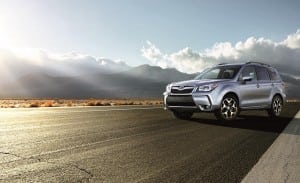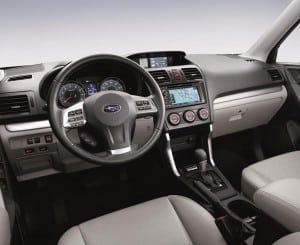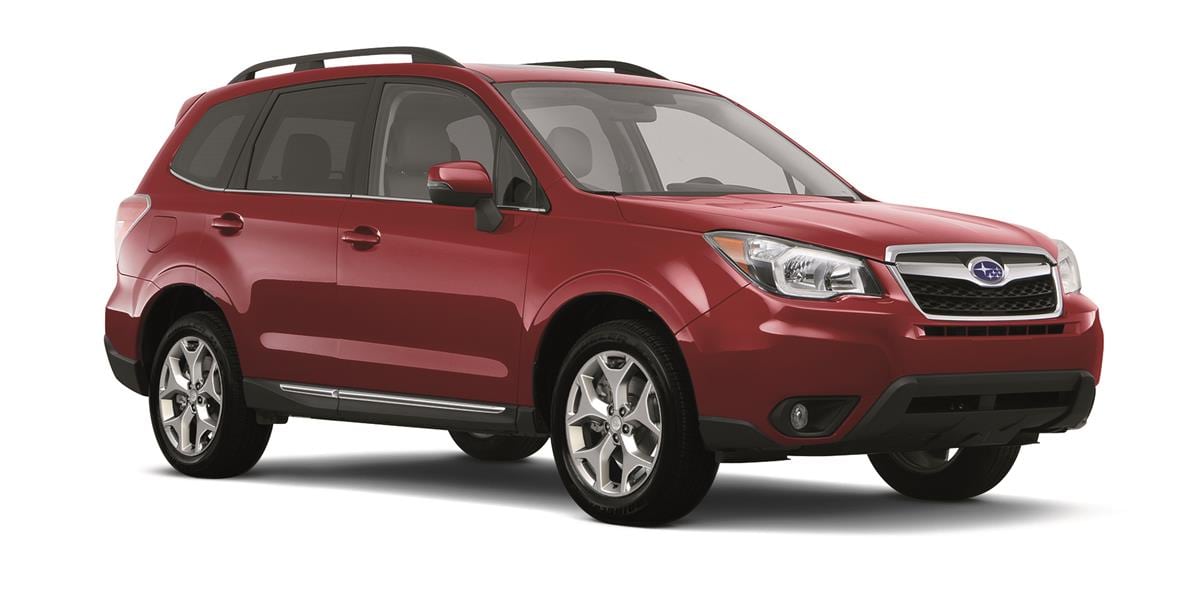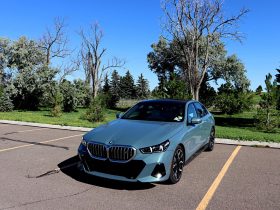Apologies to my Driver’s Side readers here; I did not drive the 2014 Subaru Forester last year. Why is that a big deal you ask? Well, my tester this week is the 2015 Forester and I was prepared to rave about how amazing this model year was. Until I researched to learn that the 2014 model year version of this crossover was when it was completely redesigned. The last Forester I drove was in 2013 and I absolutely didn’t like it, to the point where it soured me on all future Foresters – until now.
Little was changed for the 2015 Forester, but it’s on the heels of the much-needed overhaul it received last year.
Regardless of when the updates came (this model year or the previous one), let’s take a closer look at the 2015 Subaru Forester.
A knock I’ve always had on the entire Subaru brand is the overall lack of styling for most of their vehicles. However, for the 2015 Forester that’s simply not the case.
Exterior
 On looks alone, the Forester is modern and handsome, yet maintains the overall simplistic styling of Subaru. The grille is conservative, lacking flare, but also presenting itself in a clean stylized way. The profile of the Subaru Forester is where the design engineers really hit their mark. A chiseled appearance flows well along the side panels where slightly bulbous wheel wells work congruently with the styling of the Forester.
On looks alone, the Forester is modern and handsome, yet maintains the overall simplistic styling of Subaru. The grille is conservative, lacking flare, but also presenting itself in a clean stylized way. The profile of the Subaru Forester is where the design engineers really hit their mark. A chiseled appearance flows well along the side panels where slightly bulbous wheel wells work congruently with the styling of the Forester.
Nearly straight-up B and C pillars indicate that there will be significant headroom inside. And while this gives the Forester a boxy look, it still maintains enough of a sculpted profile to not look too much like a box on wheels.
Interior
Inside is where I was most impressed. Subarus generally offer sparse interiors, harder touchpoints and less-than-lavish surroundings. The back-to-basics styling of Subarus have always been part of their appeal to the Subie owners out there. I always wanted a little bit more. With the 2015 Subaru Forester I got that little bit more.
Materials were slightly improved. Touch points seemed well made. I really appreciated the simple, almost minimalist design of the center stack. This all goes along with Subaru’s overall theme, of keep it simple, and in the Forester it flows well. The infotainment system is still a little dated with a cumbersome touchscreen that is not intuitive. However, this system was an improvement over the last infotainment system I experienced in a Subaru, so there is some progress.
 With its tall roofline, headroom is vast for even the tallest of passengers. Rear seat legroom is average, but that is overcome by comfort of the shoulder and headroom for those passengers. No worries about having adults in the back seat of the Forester. My tester had a gorgeous panoramic sunroof too.
With its tall roofline, headroom is vast for even the tallest of passengers. Rear seat legroom is average, but that is overcome by comfort of the shoulder and headroom for those passengers. No worries about having adults in the back seat of the Forester. My tester had a gorgeous panoramic sunroof too.
Cargo room for the Forester is at the top of the class. Fold the rear seats down and enjoy 74.7 cubic feet of space (for models without the sunroof) and 68.5 cubic feet for my tester (with the sunroof). Either way, the Forester has always put the utility in Sport Utility Vehicle and this model is certainly no exception.
Engine/Performance
The 2.5-liter horizontally-opposed four cylinder engine makes only 170 horsepower. This seems underpowered, and off the line and in some situations it is. A continuously variable transmission (CVT) does not help this impression. The transmission lacks responsiveness in certain gears, which is typical of most CVTs. However, the Forester offers a smooth, relatively quiet drive performance. My tester had 17-inch wheels giving it a more rugged driving performance.
And all of that is expected of the Subaru brand and why there are so many Subie loyalists out there. For them, they’ll especially appreciate this Forester.
Fuel economy
For an all-wheel drive crossover, fuel economy is impressive. The Forester (with CVT) has an EPA rating of 24 mpg/city and 32 mpg/hwy. In a week’s worth of driving, I averaged 27 mpg.
Trims/Pricing
There are six trim levels and two engine options for the Forester. Outside of the 2.5-liter, there is a more powerful, turbo-charged 2.0-liter engine. My tester was the middle-tier trim 2.5i premium, which adds 17-inch alloys, heated side mirrors and heated front seats and roof rails. Starting price of this trim is $25,095. Lower trims are available for just over $20,000.
With extra safety options added like pre-collision braking, adaptive cruise control and lane departure warning, my tester had a final MSRP of $27,439.
There’s no doubt the entire Subaru line has a loyal consumer base. For those who haven’t considered a Subaru before, they’d be pleasantly surprised at the improvements to the Forester where it offers rugged, all-wheel drive performance, car-like handling, and SUV-like space. The Subaru Forester is certainly not flawless, but it has evolved along the way to broaden its appeal. Looking at it for what it is, instead of what it isn’t is a fair way to judge it.
Specs
2015 Subaru Forester 2.5i Premium
Price/As test price………………………. $25,095/$27,439
Mileage…………………………………… 24 mpg/city; 32 mpg/hwy
Engine……………………………………. 2.5 liter four cylinder
Horsepower/Torque……………………. 170 hp/174 lbs./ft.
Transmission…………………………….. CVT
Drive Wheels…………………………… All-wheel drive
Final Assembly Point………………….. Ota, Japan












